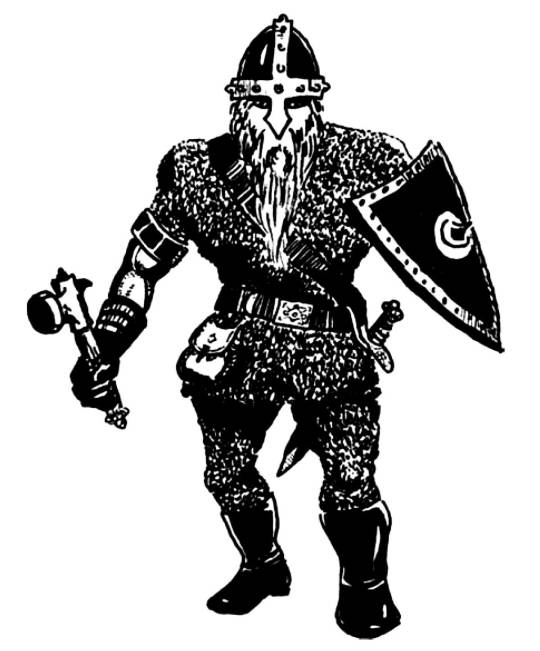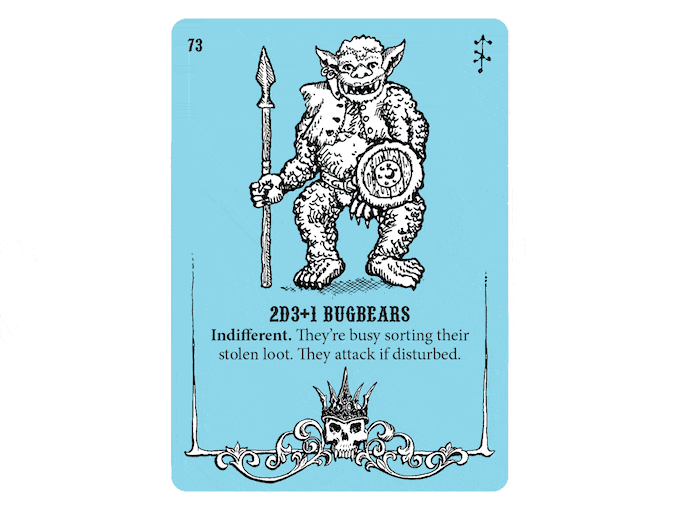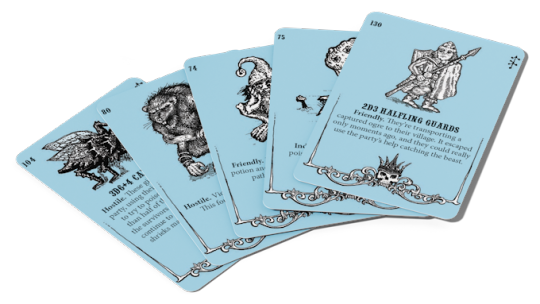#OD&D
Text


Dwarves by David Sutherland from OD&D Supplement 2: Blackmoor, 1975 (top) and the AD&D Monster Manual, 1977 (bottom). Sutherland redrew a lot of his OD&D illustrations for AD&D.
#D&D#Dungeons & Dragons#David Sutherland#dwarf#dwarves#AD&D#OD&D#Monster Manual#Blackmoor#Supplement II: Blackmoor#1970s#dnd#Dungeons and Dragons#TSR
340 notes
·
View notes
Text
Thac0, but for skills.
AD&D is basically two games held together with duct tape and bailing wire. One the one hand, you have a moderately well- thought- out tactical system. On the other, you have a hot mess of a skill game. And both of them involve rolling in opposite directions. Combat? Roll high. Skills? Roll low.
And TBH that really did it no favors.
So for Skill Thac0, you track two numbers. You have a Skill Thac0 (duh) off a chart like regular Thac0, based on what attribute maps to that skill. You also have a proficiency bonus. Aand... that's it. Proficiencies still derive from your class.
Ingame, DM assigns an AC to the skill check. So instead of "try to roll below your Int with a +5 penalty," it's "roll against Skill AC 5." So if your Skill Thac0 is 17, you want a 12. Proficiency bonus... I dunno, it'll give you a bonus or something. Maybe a +3 or so.
8 notes
·
View notes
Text
Rule Zero: A Timeline

“Rule 0” is an unofficial term for a fundamental aspect of tabletop role-playing games: the DM’s word is Law. Some games have no referee at all, but if there is such a thing as a Dungeon Master, Game Master, Storyteller, etc, then what they say goes.
This can mean two things. The first is “what they say goes, as opposed to what the players say”. Someone has to be the final arbiter on how rules are interpreted and what happens in game. And if the DM says Rocks Fall Everyone Dies, well, rocks do fall and everyone does die. (And whatever led to that should be addressed out of game.)
The second is “what they say goes, as opposed to what the rulebooks say”. As far as I know, no RPG designer has ever had the gall to claim that the rules are final and you shouldn’t change anything. Sometimes it’s left unsaid (and probably considered obvious), but most of the time rulebooks explicitly state that the DM (Game Master, Storyteller, etc) can change the rules. The attitude varies, ranging from “rules are a suggestion! do what you want!” to “you can make changes BUT take into account this and that”.
I find it interesting that D&D 3rd Edition is the most stringent in this regard. It doesn’t say “change the rules as you see fit”, it rather says “well if you must change the rules, do it right”. It makes sense, I guess: that edition was BIG on simulation, and having rules for every little thing. Like, you can calculate how many hit points the wall has, depending on size and material. That means the DM can tell how many punches it takes to break each specific wall, since unarmed attacks deal damage to objects (half dmg, but still). It also suggests that the DM shouldn’t say “you punched the wall? okay, your knuckles bleed, it hurts like hell, and the wall is fine”, which for some styles of play is in fact unfortunate, because that’s exactly what the DM should say.
(There’s no right or wrong here, different strokes for different folks, and every system caters to different needs.)
I also find it interesting that the very similar Pathfinder is conversely generous, and singles out Rule Zero as “The Most Important Rule”. This also makes sense, given that Pathfinder is essentially a house-rules project that got out of hand.
In any case, here’s a selection of different ways to say “the rules are a suggestion”.

Original D&D (1974)
“These rules [...] remain flexible. As with any other set of miniatures rules they are guidelines to follow in designing your own fantastic-medieval campaign. They provide the framework around which you will build a game of simplicity or tremendous complexity — your time and imagination are about the only limiting factors.”
– Dungeons & Dragons Book I: Men & Magic
Basic D&D (aka Eric Holmes’s revision, 1977)
“Instructions for the game referee, the “Dungeon Master,” are kept to the minimum necessary to allow him to conduct basic games. This is absolutely necessary because the game is completely open-ended, is subject to modification, expansion, and interpretation according to the desires of the group participating, and is in general not bounded by the conventional limitations of other types of games.”
– Dungeons & Dragons Basic Set
AD&D (1979)
“The final word, then, is the game. Read how and why the system is as it is, follow the parameters, and then cut portions as needed to maintain excitement. [...] The game is the thing, and certain rules can be distorted or disregarded altogether in favor of play.”
– Dungeon Masters Guide
Basic D&D: B/X (aka Tom Modvay’s revision, 1981)
“In a sense, the D&D game has no rules, only rule suggestions. No rule is inviolate, particularly if a new or altered rule will encourage creativity and imagination. The important thing is to enjoy the adventure.”
– Dungeons & Dragons Basic Rulebook
Basic D&D: BECMI (aka Frank Mentzer’s revision, 1983)
“You may use all or part of these rules. They often include several ways of playing and running the game. You may create new rules, monsters, and magic, using these rules as guidelines.”
– Dungeons & Dragons Fantasy Roleplaying Game Set 1: Basic Rules
AD&D (2nd Edition, 1989)
“Take the time to have fun with the AD&D rules. Add, create, expand, and extrapolate. Don’t just let the game sit there, and don't become a rules lawyer worrying about each piddly little detail. If you can’t figure out the answer, MAKE IT UP! And whatever you do, don’t fall into the trap of believing these rules are complete. They are not. You cannot sit back and let the rule book do everything for you. Take the time and effort to become not just a good DM, but a brilliant one.”
– Dungeon Master Guide

D&D (3rd Edition, aka 3.0, 2000)
“Changing The Rules: Beyond simply adjudicating, sometimes you are going to want to change things. That’s okay. However, changing the rules is a challenge for a DM with only a little experience.”
– Dungeon Master’s Guide
Note: I won't quote the whole thing, but it goes into some length on what to consider before changing a rule. I’m gonna bet that when they suggested you ask yourself “How will the change impact other rules or situations” they hadn’t predicted that 3rd Edition would end up with 215 books full of interconnected rules, NOT including adventures and periodicals.
D&D (Version 3.5, 2003)
“The power of creating worlds, controlling deities and dragons, and leading entire nations is in your hands. You are the master of the game—the rules, the setting, the action, and ultimately, the fun. This is a great deal of power, and you must use it wisely.”
– Dungeon Master’s Guide
Note: I won’t quote the whole thing, but it says there are different styles of play, and if you like combat-oriented games you should be “very careful about adjudicating rules and think long and hard about additions or changes to the rules before making them”, whereas if you’re into deep-immersion storytelling, rules become less important: “feel free to change rules to fit the player’s roleplaying needs. You may even want to streamline the combat system so that it takes less time away from the story.” Or you can go for something in between.
Deadlands (Revised Edition, 2004)
“The rules in the Weird West Player’s Book are fairly detailed. [...] Characters need all that detail because they can’t cheat. But you’re the Marshal. You can do whatever the Hell you want to, and that’s official partner.”
– The Marshal’s Handbook
GURPS ( Revised Third Edition, 2004)
“The GM is the final authority. Rules are guidelines . . . the designer’s opinion about how things ought to go. But (as long as he is fair and consistent) the GM can change any number, any cost, any rules.”
– GURPS Basic Set
D&D (4th Edition, 2008)
“If you disagree with how the rules handle something, changing them is within your rights.”
– Dungeon Master’s Guide

Pathfinder (1st Edition, 2009)
“The Most Important Rule: The rules in this book are here to help you breathe life into your characters and the world they explore. While they are designed to make your game easy and exciting, you might find that some of them do not suit the style of play that your gaming group enjoys. Remember that these rules are yours. You can change them to fit your needs.��
– Pathfinder Roleplaying Game Core Rulebook
D&D (5th Edition, 2014)
“The D&D rules help you and the other players have a good time, but the rules aren’t in charge. You’re the DM, and you are in charge of the game.”
– Dungeon Master’s Guide
Vampire: The Masquerade (5th Edition, 2018)
“If the rules in this book interfere with your enjoyment of the game, change them.”
– Vampire: The Masquerade (5V corebook)
Legend of the Five Rings (5th edition, 2018)
“Your Game, Your Rokugan: This game is designed to support numerous styles of play and, as GM, you are empowered to jettison, rework, or simplify rules as you desire.”
– Legend of the Five Rings Core Rulebook
Pathfinder (2nd Edition, 2019)
“As Game Master, you have the final say on how the world and rules function.”
– Pathfinder Core Rulebook
#d&d#pathfinder#vtm#Legend of the Five Rings#Deadlands#I left out a bunch of them obviously#roleplaying#how to rogue#trs#be the chaos you want to see in this world#d&d history#od&d#ad&d#ad&d 2E#3.5#3.0#5e
361 notes
·
View notes
Text

Dia Dia! A Dark Cleric rolled by a dear friend, for an OD&D campaign I led back in COVID lockdown. Her character was so compelling that I've done some of my best colouring for it.
11 notes
·
View notes
Photo

A D&D character sheet from 1975. This was before a lot of game terminology got set in stone so we’ve got experience points abbreviated as EP instead of XP or EXP, level referred to as degree, and race referred to as Creature type. I actually really like that last one--anything is better than calling it race, and I’d be absolutely thrilled to have a sheet that said Creature type: Human on it.
Also, the fact that an OD&D character sheet can easily fit on an index card is the perfect representation of why it’s my favorite edition.
49 notes
·
View notes
Text
i’m running an old-school dungeon crawler! finally!!
i’ll be using a big mash-up of Delving Deeper + a Luke Gearing’s Wolves Upon the Coast and Snackrifice rules. sounds like a lot, but it’s mostly:
the six trad stats w/ three saves (Dodging, Physique, Warding)
simplified attack bonus tables
simplified weapon damage (d6 for everything; light weaponry rolls 2d6kL, heavy weaponry rolls 2d6kH) and weapon qualities
simplified attack rolls (d20 + modifiers + target AC > 20)
simplified encumbrance (AC + 5 slots)
it’s going to be so fun!
2 notes
·
View notes
Text

In the beginning there was Dungeons and Dragons™ -- Original Dungeons and Dragons, later called the Collector's Edition. Then there were Greyhawk and Blackmoor and Eldritch Wizardry, which were essentially Expanded Original D&D. Then came Advanced D&D (which was advanced Original D&D), and Basic D&D (which was basic Original D&D). And ultimately, we have Expert D&D, which is expert Basic D&D, not expert Original D&D, or expert Advanced D&D; and Expert Basic D&D brings it all to the same approximate scope as Original D&D. One gets the impression that the TSR crew spends its off-hours designing mazes for rats to become lost in.
Aaron Allston summarizes the history of D&D editions through the first 8 years, from the opening paragraph of his review of Cook & Marsh's Expert D&D rules in The Space Gamer 38, April 1981. His review is generally positive, noting that it is much better edited while fixing some but not all problems with the original game:
I wish I had had the Basic D&D series when I began gaming. The rules sets are legible, indexed, punched for 3-hole notebooks, reorganizable, and, best of all, understandable. One actually can learn the game from the rules, something not possible with Original D&D.
That is, however, perhaps the most annoying part about this set of rules. With sufficient playtesting, it could have been released seven or eight years ago, instead of the original set. This series is the product of hindsight.
The complete 1981 B/X D&D (Moldvay's Basic and Cook & Marsh's Expert) remains one of the best-loved early versions of D&D, directly inspiring many of the OSR clones like Labyrinth Lord and Old School Essentials.
#Aaron Allston#Dungeons & Dragons#D&D#gaming history#dnd#The Space Gamer#Dave Cook#Steve Marsh#Expert D&D#OD&D#BX D&D#Dungeons and Dragons#Space Gamer#1980s
255 notes
·
View notes
Text

Don't think I've posted about this one.
In Dragon #100 there's an adventure in which the party is required to travel to England in the year 1985) to steal a magic weapon from a museum.
13 notes
·
View notes
Text
I've backed a number of Reed's projects, and these are particularly wonderful. That art is fantastic!



Deck of Old-School Encounters Set Two, OSR Fantasy RPG Cards by Philip Reed — Kickstarter
#D&D#AD&D#OD&D#rpg#systemless rpg#encounters#wandering monsters#cards#deck#kickstarter#ose#old school essentials
2 notes
·
View notes
Text

How can anyone not love this?
3 notes
·
View notes
Text
I feel consistently torn between the only styles of games I care about being “little freaks plumbing a dunge for knickknacks” and “tranquil but wearisome journeys with your found family”.
I think I finally cobbled together a ruleset that works wonders for both but how to sell a group on a campaign like..? “We’re gonna have three sessions of travel to the dunge, then god knows how many in the dunge, and any time you leave you’re gonna spend three sessions traveling.”
21 notes
·
View notes